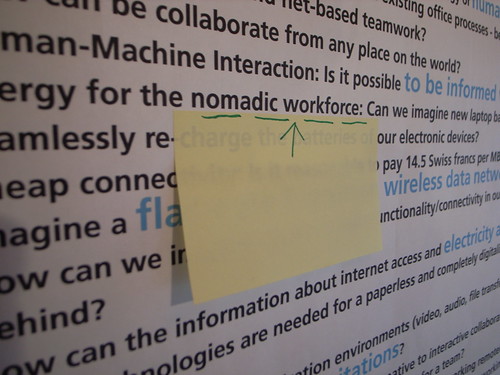Bits and pieces, quotes and notes about a workshop about "nomadic work" I helped organizing (along with Jef Huang, Mark Meagher, Silke Lang, Isabelle Bentz and Alvise Simondetti) on tuesday. Why a workshop about nomadic work in an infoviz conference? because the point was to envision how information visualization could be a way to overcome some of the problems/limits/pain points experienced by mobile workers.

The workshop lasted one day and was based on two parts: 1) a discussion of the current nomadic work situation of the participants through discussion of pictures and maps. This helped us to set research topics, limits and opportunities that can lead to design opportunities. 2) a quick and dirty brainstorm about how to design for such topics.
The 'nomadic work' themes we explored concerned (btw yes they overlap): - selective connectivity: how can we manage our time: being offline on vacation, offline but working on a project, online and available to discuss with others. - supporting collective grounding: how to build trust and mutual understanding over distance - awareness of various kinds: which information about one's state to share - the office in a pocket: access to resources - temporary appropriation of space: how to appropriate certain places to work during short amount of time
Francesco Cara interestingly described how work process became 24/7, more a matter of an engagement. To him, the office cleaning used to mark the end of the day, with a fresh start the morning after finding a clean office. Now in certain companies who have office cleaning at 2pm, this ritual is lost. What happens, as he pointed out, is that work will more and more be project-based, about multitasking and with a increasing mix of personal and professional tasks. Jef then remarked that maybe the problem is not make work like home but instead to to make home look like work, how to liberate from domesticity.
Yasmine explained how things unfold in the company she's recently joined: they're a pool of consultants so the office is often too small for when they're all present (back from the field) and too big when they're on the field doing ethnographic research.
Another relevant point raised by Francesco was the "myth of the overload": when looking at the data, what is stressful for people is not that receive too many phone calls or message (in mobile situations) but rather the potentiality to receive them.
As pointed by Roberto: "I don't care about where my colleagues are, they can be in the toilets, as soon as the work is done" "Second Life is a place populated by journalists who have virtual sex with each other to write articles about people having sex in virtual reality" "Most people look bad on picture (me included), I would rather see their heartbeats"
Alvise also described that: "I like cubicles because I can create my own patch of people with videoconferencing applications, I see my colleagues... So when my colleagues are picking their nose I see them but in the end you would skip noticing, besides the sound is too intrusive, I muted it"
Why do I blog this? as the seminar I attended yesterday, it's not directly connected to my research about gaming/space but it's tightly linked to some of my research concerns about computer-supported collaborative work, mobile work and the user experience of such technosocial situations. These messy notes are elements I found intriguing from the day and that we might use to do the write-up.
